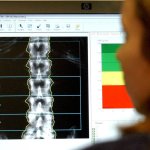All UK children should be given a “digital vaccination” of access to technology and digital skills that ensures they are not susceptible to misinformation and to help close the digital divide, a new report has said.
The report says a minimum digital living standards framework should be established, which would look to ensure that every household has a set level of digital infrastructure, including high-speed broadband, a functioning digital device and digital skills training.
The study has been published by former children’s commissioner Anne Longfield’s Centre for Young Lives think tank, and the Child of the North initiative – which includes a research partnership between eight universities in the north of England.
It says millions of children are being left behind because they do not have regular access to technology and the skills needed to make the best use of it – known as the digital divide – and warns these children are therefore more open to the risks of fake news, disinformation and other online harms.
In addition, it says these children will be under-skilled when they enter the workplace in an increasingly digital and online world.
According to the study, 42% of young people – approximately six million children – do not have access to either home broadband or a home computer, and 75% of young people feel they lack the necessary skills to thrive in the future, with almost half of young people saying they are teaching themselves digital skills.
Financial constraints are highlighted by the report as a key contributor to the digital divide, with one million people said to have cut back or cancelled their internet package because of financial pressures, with 12% of people in the north east of England classified as internet non-users, compared to only 7% in London.
The report says digital skills shortages are already estimated to cost the UK £65 billion each year.
In response, the study urges the Government to consider adopting the minimum digital living standards framework, as well as boosting digital training and support for schools and teachers and a central, national resource platform for digital skills development.
Ms Longfield, executive chair of the Centre for Young Lives, said: “Children are growing up digital but we are not giving them the technology and skills they need to make the most of the opportunities it brings or protection they need to navigate the online world safely.
“Technology and the internet provide access to a world of opportunity and are now a crucial part of childhood and our futures.
“The recent outbreaks of violence in England have shown the consequences of disinformation and its impact on the real world. It is crucial that we develop more effective ways of preventing children and young people from being exposed to fake news and vaccinate them against its dangers.
“That means providing children with the digital skills they need, providing teachers with the time and training to keep up to date with digital advancement, and ensuring children are learning about disinformation and other potential online harms from an early age.
“We also need to equip children for the digital world they live in. Four in 10 children do not have either home broadband or a laptop or desktop computer. This is not just a problem that happened during Covid. This ongoing digital divide is still leaving behind millions of children, which can have profound implications for their educational outcomes and future employment prospects.
“We need to be far more creative and much bolder about how we close the digital divide and improve access to tech and learning.
“We can’t hope to achieve the aim of becoming a world-beating economy with a well-trained and well-educated workforce for as long as a substantial number of young people are shut out of the digital world.”
A Government spokesperson said: “Digital skills are the new foundation for life and it is more important than ever we give young people the knowledge and ability to challenge what they see online.
“That is why our curriculum review will develop plans to embed critical skills in lessons to arm children against disinformation and fake news, ensuring every child is equipped for the future.
“Outside of the classroom we are bridging the digital divide and rolling out reliable broadband through Project Gigabit with a goal of full gigabit coverage by 2030. This will help empower every corner of the country to embrace the transformative power of technology.”











